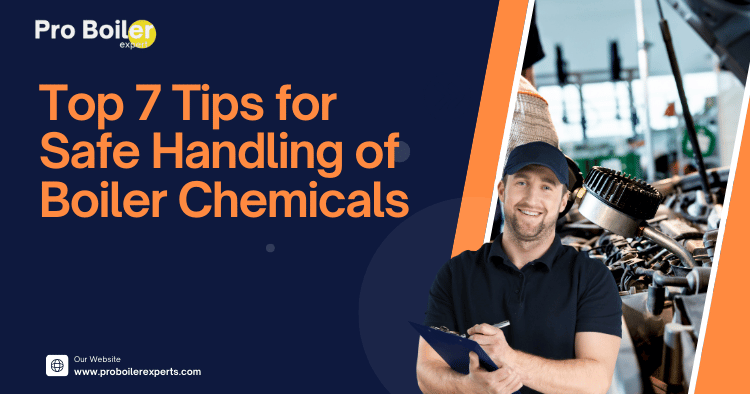Table of Contents
- Understanding Boiler Chemicals
- Know Your Chemicals
- Use Personal Protective Equipment (PPE)
- Proper Storage Practices
- Adhere to Safety Data Sheets (SDS)
- Training and Awareness
- Emergency Procedures
Boiler chemicals play a crucial role in maintaining the efficiency and safety of boiler operations. However, these chemicals can pose risks if not handled correctly. In this article, we’ll explore seven essential tips for the safe handling of boiler chemicals, ensuring you keep your workplace safe while maintaining optimal boiler performance.
Understanding Boiler Chemicals
Boiler chemicals are substances used to treat water in boiler systems, prevent corrosion, scale buildup, and ensure efficient heat transfer. Common types of boiler chemicals include:
- Corrosion inhibitors: Prevent rust and degradation of metal surfaces.
- Scale inhibitors: Reduce mineral deposits that can affect efficiency.
- Biocides: Control the growth of harmful microorganisms in water.
Understanding the purpose and risks associated with these chemicals is the first step toward safe handling. For more information on energy-efficient heating options that utilize these chemicals effectively, consider checking out Top 5 Benefits of Choosing Combi Boilers for Your Home and Top 5 Benefits of Condensing Boilers You Should Know.
Know Your Chemicals
Familiarize Yourself with Chemical Properties
Before working with any boiler chemicals, it’s essential to understand their properties, including:
- Toxicity: Some chemicals can be hazardous if inhaled or ingested.
- Reactivity: Certain chemicals may react violently with others.
- Environmental Impact: Consider how the disposal of these chemicals can affect the environment.
Resources for Identification
You can find comprehensive information about specific chemicals on resources like NIOSH Pocket Guide to Chemical Hazards or PubChem.
FAQs
- How can I identify a chemical? Use chemical labels, Safety Data Sheets (SDS), and online databases to gather information.
- What should I do if I’m unsure about a chemical? Consult with a supervisor or safety officer before proceeding.
Use Personal Protective Equipment (PPE)
Essential Gear
Using appropriate PPE is vital when handling boiler chemicals. The specific gear you may need includes:
| PPE Item | Purpose |
|---|---|
| Safety goggles | Protects eyes from splashes and fumes |
| Gloves | Shields hands from harmful substances |
| Respirators | Filters out harmful vapors or dust |
| Protective clothing | Prevents skin contact with chemicals |
Ensure PPE is properly fitted and maintained. Regularly inspect PPE for any signs of wear and tear.
FAQs
- What type of gloves should I use? Choose gloves made of materials that resist the specific chemicals you are handling.
- Is it necessary to wear a respirator? Yes, if there is a risk of inhaling vapors or dust, especially in poorly ventilated areas.
Proper Storage Practices
Safe Storage Guidelines
- Labeling: Clearly label all chemical containers with the substance name, hazard warnings, and handling instructions.
- Ventilation: Store chemicals in a well-ventilated area to reduce the risk of harmful exposure.
- Temperature Control: Keep chemicals at the recommended storage temperature to prevent degradation or reactions.
Recommended Storage Layout
| Storage Area | Description |
|---|---|
| Secure Cabinet | Lockable cabinets for hazardous chemicals |
| Shelves | Use sturdy shelves to keep chemicals off the floor |
| Spill Containment | Utilize trays to contain spills and leaks |
FAQs
- How should I dispose of expired chemicals? Dispose of them according to your facility’s waste management protocols and local regulations.
- Can I store different chemicals together? Only store compatible chemicals together, as some may react dangerously.
Adhere to Safety Data Sheets (SDS)
Importance of SDS
Safety Data Sheets provide crucial information about the hazards, handling, and emergency measures associated with specific chemicals. Familiarizing yourself with the SDS for each chemical you handle is essential for safety.
Key Sections of an SDS
- Identification: Name and purpose of the chemical.
- Hazard Identification: Potential hazards and health effects.
- First-Aid Measures: Steps to take in case of exposure.
FAQs
- Where can I find SDS for the chemicals I use? SDS are typically available from the chemical supplier or can be found online.
- How often should I review SDS? It’s good practice to review SDS whenever you work with a new chemical or after any significant changes in procedures.
Training and Awareness
Training Programs
Regular training programs are essential for employees who handle boiler chemicals. These programs should cover:
- Safe handling procedures
- Emergency response protocols
- Proper use of PPE
Encourage a culture of safety by promoting open communication about chemical hazards and safety concerns. Regularly share updates and reminders about safe practices.
FAQs
- How often should training be conducted? Training should be conducted at least annually or whenever new chemicals or equipment are introduced.
- What should I do if I witness unsafe practices? Report any unsafe practices to a supervisor immediately.
Emergency Procedures
Prepare for the Unexpected
Even with the best safety practices in place, accidents can occur. Having a plan for emergencies is vital.
Key Emergency Procedures
- Evacuation Plan: Ensure everyone knows the emergency exits and assembly points.
- Spill Response: Have materials on hand to contain and clean up spills safely.
- First Aid Kit: Keep a well-stocked first aid kit accessible and ensure staff are trained in its use.
FAQs
- What should I do in case of chemical exposure? Follow the first-aid measures outlined in the SDS and seek medical attention if necessary.
- How can I prepare for a spill? Conduct regular drills to practice spill containment and cleanup.
By following these seven tips for the safe handling of boiler chemicals, you can ensure not only your safety but also the efficiency and longevity of your boiler systems. Remember, safety is a shared responsibility—always prioritize it in your daily operations!
For further reading on chemical safety, check out resources like OSHA’s Chemical Safety page. Also, consider exploring Top 5 Smart Boilers Revolutionizing Home Heating in 2024 for insights on advanced technologies that can enhance your boiler’s performance while ensuring safety.





